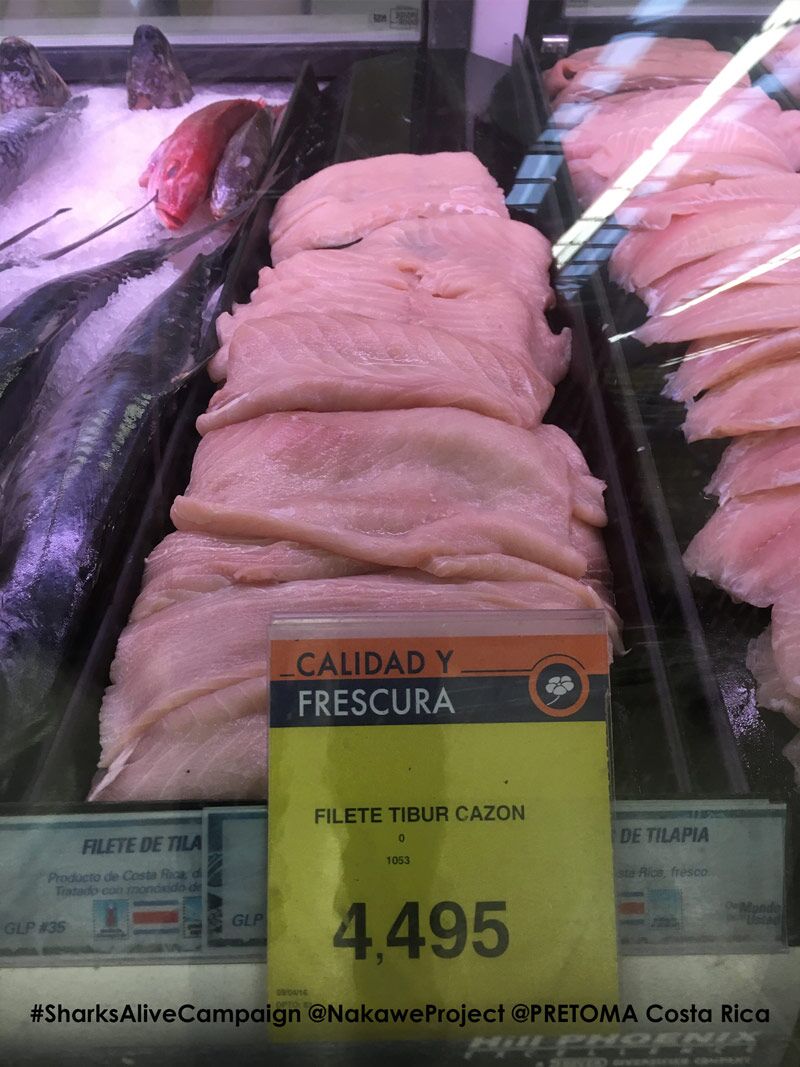For Immediate Release: June 6, 2016
Images available for media use with proper credit: https://www.dropbox.com/sh/sujsophd2zjtq7d/AADCeCOD1Kv5dFspyKhZdgWRa?dl=0
CONTACT:
Randall Arauz
International Policy Director
Turtle Island Restoration Network (Costa Rica)
Cell: 8344-3711
rarauz@tirn.org
Joanna Nasar McWilliams
Communications Director
Turtle Island Restoration Network
Cell: (415) 488-7711
Joanna@SeaTurtles.Org
Study Shows Shark Meat in Costa Rican Markets Has High Levels of Toxic Mercury
Three shark species tested exceeded Food and Drug Administration’s (FDA) human health limits
San Jose, Costa Rica (June 6, 2016) – New data from George Mason University has revealed that shark meat sold in San Jose and Heredia food markets contain high levels of toxic mercury. The levels are so high that three shark species tested exceed U.S. federal health guidelines. Advocates are advising consumers, and especially women and children, to not buy shark due to risks to human health.
Researchers Jason R. O’Bryhim, a Ph.D. graduate with George Mason University in Virginia, USA, and Stacey Lance from the University of Georgia Savannah River Ecology Laboratory USA gathered the new data. They collected 170 shark, ray, and fish muscle tissue samples from Costa Rican markets in San Jose (10 pescaderías) and Heredia (5 pescaderías) over a five-day period in September 2014. O’Bryhim and Lance analyzed the amount of total mercury in each sample using standard US Environmental Protection Agency (EPA) approved procedures.
“It is very concerning to find that samples for three shark species tested exceeded U.S. health guidelines,” said O’Bryhim. “Silky sharks are a special concern since they account for 70 percent of all the shark sold to the public in those markets and a number of the samples tested exceeded the U.S. health threshold.”
“This is yet another reason why Costa Ricans should reduce their annual consumption of 2,000 tons of shark meat, most of which consists of silky shark chops,” said Randall Arauz International Policy Director for Turtle Island Restoration Network. He added, “Don’t eat shark. Mercury contamination is a known risk to women and children.”
Arauz, a Costa Rican who won the prestigious Goldman Environmental Prize in 2010, has been fighting to end shark finning, reduce fishing pressure on sharks, and create marine protected areas. He will be working with an international coalition to increase the protected status of silky sharks this fall during the Convention on International Trade in Endangered Species of Wild Fauna and Flora (CITES) meeting in South Africa.
Species tested include scalloped hammerhead (Sphyrna lewini), silky shark (Carcharhinus falciformis), smooth hammerhead (Sphyrna zygaena), and blacktip shark (Carcharhinus limbatus). Within the markets, total mercury concentrations in the shark products being sold were highest in smooth hammerheads and blacktip sharks, which exceeded U.S. FDA mercury limits of 1.0 ppm for wet weight.
Individual samples of silky sharks and scalloped hammerhead sharks also exceeded the U.S. FDA threshold. A consumer buying these fish will risk consuming potentially high levels of mercury.
| Shark Species | US FDA Limit | Mean Concentration in Sample* | Health Warning |
| Pelagic thresher
(Alopius pelagicus) |
1.0 ppm | 0.36 ppm | Risk to children |
| Silky shark
(Carcharhinus falciformis) |
1.0 ppm | 0.76 ppm | Highest samples at 1.6 ppm |
| Blacktip shark
(Carcharhinus limbatus) |
1.0 ppm | 2.50 ppm | 2.5 times US EPA threshold |
| Scalloped hammerhead
(Sphyrna lewini) |
1.0 ppm | 0.81 ppm | Highest samples at 1.64 ppm |
| Smooth hammerhead
(Sphyrna zygaena) |
1.0 ppm | 3.50 ppm | 3.5 times US EPA threshold |
| Sicklefin Smoothhound
(Mustelus lunulatus) |
1.0 ppm | 1.22 ppm | Exceeds US EPA threshold |
* Sample size – n=5, n=115, n =6, n=5, n=7, n=1
Another concern raised by the study is that, within the Costa Rican markets, sharks are not labeled to differentiate species. Therefore consumers cannot choose shark species that might be lower in mercury concentrations. “People buying shark are doing so blindly,” warned Maike Heidemeyer of the Costa Rican organization PRETOMA. “For example, a recent study conducted by researcher of the UCR found low mercury levels in coastal shark and ray species, but the degree to which these are being consumed in Costa Rica is unknown. In contrast, O’Bryhim shows that shark species that in fact end up in Costa Rican markets are loaded with mercury. Therefore, if you don’t know what you are buying, the best option for the health of your family is to not buy shark at all.”
“We can’t wait for the Costa Rican government to take actions to help sharks, there is just no time nor political will,” regretted Arauz. “By not eating shark, we can all help protect both public health and the oceans, it’s the right thing to do.”
Mercury accumulates organically as methylmercury in the human liver, kidney, brain, and blood and can harm a child’s developing nervous system even at relatively low levels. Health effects are scientifically well documented and include birth defects, impaired motor skills and other developmental disabilities. Larger, longer-lived, top-of-the-food marine species, like pelagic sharks, have the highest levels of methylmercury in their tissue.
Consumers can check the amount of mercury in seafood using a simple online app at:
https://seaturtles.org/programs/mercury/ (English version)
http://seaturtles.org/gotmercury_html/espanol/ (Spanish version)
Images available for media use: https://www.dropbox.com/sh/sujsophd2zjtq7d/AADCeCOD1Kv5dFspyKhZdgWRa?dl=0
###
Turtle Island Restoration Network, www.SeaTurtles.org, and its 250,000 members and supporters, works to mobilize people and communities around the world to protect marine wildlife, the oceans and the inland waterways that sustain them. Join us on Twitter, Facebook and YouTube.
PRETOMA is a Costa Rican NGO that works to conserve, manage and restore, populations of endangered marine wildlife.




